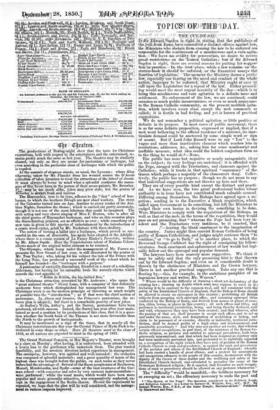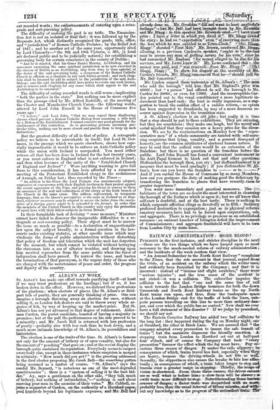TOPICINDIOMMAY.
.TA(LtiUlea
Tadaro/I dp/410 Jrn,tglirennt),:- Icw.ster4.1 • imoi Ades ate, publishers 4j) ,1 flistiiet. offence agaitletlaw R
ureatriotionsaim Catholics ; -but-if Sir Edward;
tiliesMjleiAtiikaiwbu 4votiWt Salsa recasitig the law to be-enforced ass reiponsibladfortht omilitlliande of a! mischievous and a vain agitan tiormA We 'thaw ,tuiptitidittro ftii,peraeoutioni sitl :desire to revive: Sugden is right, there are several reasons for putting his'auggei= ing would meet the most urgent necessity of the day—which is to bring this mischievous and vain agitation to a definite issue and settlement. No enforcement of the law, we are convinced,' could Conlin rauticesielluethe ■dirstIplatell while a law- remains-it:UAL° stattite-
fanetionlifle
ttildlotfl1i 1 bee onfdreed, or' the itreeutiVe near 414
14:ililittare for a repeal of the law. Either pi oceel-;
hit Ji ThenwtoMent the Minietry deems a 'Mille' 'be enforced, that Ministry ought at once to
tiring on the mood and conduct of the whole occasion so much public inconvenience, or oven so much annoyance to The Boman Catholic community, as the present mobbish agita- tion, which involves every class except the mob commonly so called ; it is fertile in bad feeling, and yet is barren of practical suggestions.
I'Ve do not remember a political agitation so little positive or
definite in its purpose. In most cases of public movement, there is so far some definite proposition, expressed or implied, that if a mob went bellowing to the official residence of a minister, its roar-; tioulate demand could. be answered by some simple won' or s4n of assent. But if Lord John Russell were to say "Yea to the- vague and more than inarticulate clamour which reaches him in resolutions, addresses, &c., asking him for some nondescript and ineffable measure, what idea could the boldest conjecture form as to the thing he would do ?—None.
The public has none but negative or nearly antagonistic ideas'
on the subject; its very feelings are undefined : it is offended with the Pope, enraged with, the Tractarians, and clamours against the Cathohes; while it trusts in that spiritual " supremacy " of the Queen which perhaps a majority of the clamourers deny. Calico-, tively, the public has no purpose ; though we do not mean to say that individual suggestions are not thrown up here and there.
They are of every possible kind except the distinct and practi-
cal. As we have seen, the two great professional bodies whose' anthority is in issue have not contributed much valuable counsel: Differing among themselves the Bishops have agreed upon a ne- gation; sending in to the Lecutive a blank requisition which, called upon Government to do something, but left the Ministers to cudgel their own brains in devising the something to be done, Were Ministers to comply with the requisition of the Bishops, as well as that of the mob, in the terms of the requisition, they would pass an act premising, that " whereas the Pope had been very in- solent and the Tractarians very insidious, be it enacted, that
,"—leaving the blank enactment to the imagination of
the country. Juries might then convict Roman Catholics of being guilty of Roman Catholicism, and judges might sentence them " to continue," or " to go to Bath," or to another place, to which the Reverend George Cuthbert has the right of consigning his fellow-' creatures. Such enactment itiul enforcement of law would but logi- cally follow out the episcopal and popular demand.
The lawyers have been scarcely more suggestive. We think it may be safely said that the only promising hint is that thrown. out by Sir Edward Sugden ; and even on it considerable doubt is thrown by the abstinence of Ministers and the Crown lawyers. There is not another practical suggestion. Take any one that is floating by,—this, for example, in the ambitious pamphlet of ant ingenious lawyer and writer, Mr. Warren.° Where would be the difficulty of framing a short act declaratory of the
existing law; clearing up doubts which some may suppose to exist in it :I declaring it to be contrary to the common weal, and not consistent with the safety of the Established Church of England, that the Bishop of Rome should be allowed to create an episcopacy in this country ; prohibiting all British subjects from accepting such episcopal office, and assuming emacopal titles conferred by the Bishop of Rome, and derived from names or places of coun- ties, cities, towns, or places in this country; all such offices and titles, and pretences to territorial jurisdiction, being, and being thereby declared, null and void, whensoever they may have been created ; and that whoever, after the passing of that act, shall presume to accept such offices, and to act as, and under the name, style, and designation of archbishop or bishop, and claim to be possessed of or exercise, directly or indirectly; territorial uris-- diction, shall be deemed guilty of j a high crime and misdemeanour, and punishable accordingly ? And why may not another act recite, that whereas certain official recognitions, in past time, of the ministers of the Roman Ca- tholic religion, as prelates and entitled to episcopal precedency, bath been grievously misconstrued, and that which had been designed as courtesy only had been insidiously perverted into, and pretended to be rightfully regarded
i
as, a recognition of the right (which they have not) of prelates of the Roman. Catholic Church to rank and precedency, as against the rank and precedency of the prelates and others of the Established Church of England ; whereby had been created a handle of great offence, and a pretext for assumptions and usurpations offensive to the people of this country, inconsistent with the dignity of the Crown of these realms and the wellbeing and safety of the Established Church thereof, and calculated to prejudice the cause of the Protestant Reformed religion •, Be it enacted, that hereafter no such recogni- tions of rank or precedency should be allowed on any pretence whatsoever.",
The " difficulty" would be manifold,—the boldness necessary for' so sweeping an act ; the effrontery necessary to undo the past and
• "The Queen, or the Popet The Question considered in its Political, Legal, and Religious Aspects : in a Letter to Spencer H. Walpole, Esq., Q.C., M.P. By Samuel Warren, Esq., F.R.O., of the Inner Temple, Barrister-at-4w." Published by Blackwood and Sons. grade and sect-pursuing policy. The difficulty of undoing the past is no trifle. The Emend a- tion Act is not an isolated or final : it was followed up by Bequests Act, which distinctly recognized the grade, titre, office,. and " jurisdiction" of Roman Catholic Prelates ; by the Relief Act, of 1847 ; and- by another act of the same year, opportunely cited, by Lord Clancarty—" the 9th and 10th Victoria; o. 381, (a local act declared pubhc and to be judicially. noticed,) for establishing a governing body for certain cemeteries in the county of Dublin : "And be it enacted, that his Grace Daniel Murray, Archbishop; and his successors exercising the same spiritual jurisdiction as he now exercises in the diocese of Dublin as an Archbishop, may from time to time appoint, at the desire of the said governing body, a clergyman of the Roman Catholic Church to officiate as a chaplain in any such burial-ground"; and-such chap, lain shall be licensed by and be subject to the jurisdiction of the said Arch- bishop ; and the said Archbisliopshall have power to revoke any such licence, and to remove such chaplain for any cause which shall appear to the said Archbishop to be canonical."
The difficulty of eating recorded words is still worse ;implicating " both the parties in the state." But nothing can be more explicit. than the passage cited by Mr. Alfred Radcliffe, at the meeting of the Chester and Manchester Church Union—the following words,, uttered by Lord John Russell in the House of Commons five- years ago : "I believe," said Lord John, "that we may repeal those disallowing clauses which prevent a Roman Catholic Bishop from assuming' a title held by a Bishop of the Establishment. Icannot conceive any good ground& for the continuance of this restriction. As to preventing persons assuming par- ticular titles, nothing can be more absurd and puerile than' to keep up such distinctions."
But the greatest difficulty of all is that of policy. A retrograde policy we believe to be unworkable in itself; but Lord St. Ger- mans, in the passage which we quote elsewhere, shows how espe- cially impracticable it would be to enforce an Anti-Catholio policy while the union with Ireland is unrepealed. You must either retrace all that has been done in Ireland for the last twenty years, or you must enforce in England what is not enforced in Ireland ; and then what becomes of the unity of the "Established Church of England and Ireland" Were anything wanting to give full force to this consideration, it has been afforded by a numerous- meeting of the Protestant Established clergy in the archdiocese of Armagh, oil Friday last ; thus recorded by the Times- " An address to his Grace the Lord Primate was unanimously adopted; expressive of concurrence with their English brethren in their protest against the recent aggression of the Pope, and praying his Grace to convey to them an assurance of the zeal and earnestness of the clergy of the Irish branch• of the Church in the same cause. The address represented, in temperate language, that as the Queen's prerogative is the same in Ireland as in Eng- land, whatever Measures may be adopted to secure the latter from the usurp- ation of a foreign power ought to be extended to the former, in order that the members of the United Church in this country may enjoy the protection of equal laws with their fellow-subjects in' Great Britain."
In their formidable task of dovish* " some measure," Ministers cannot have failed to discover the insuperable difficulties to a re trograde or sect-coercing ptilley. Their object must be to' narrow the issue as much as possible--te a declaration of Unquestionable. law upon the subject broadly, to a' formal question the law- courts under existing statutes, or other specific issue which' may vindicate the forms of public administration' without disturbing that policy of freedom and toleration which the mob has forgotten for the moment, but which cannot be violated without betraying the statesman into a sea of ulterior troubles, and drawing upon him merited reproaches from the same public when the furor of indignation shall have passed. To' narrow the issue, and hasten the termination of that paroxysm) is the urgent ditty of those who are charged with the maintenance of peace' and order, the progress and dignity of the country.



























 Previous page
Previous page